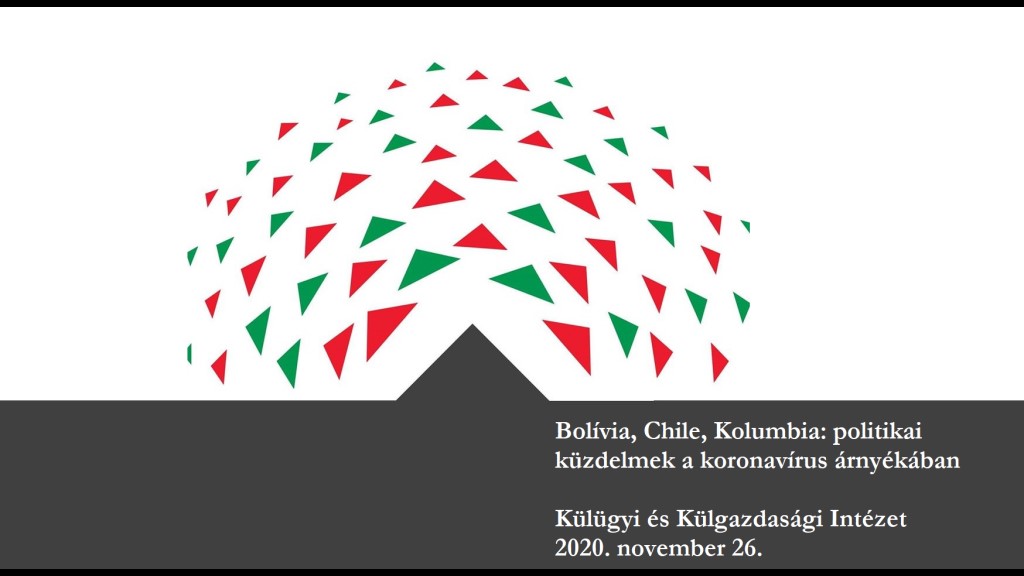On 26 November 2020, the Institute of Foreign Affairs and Trade held an online roundtable on political processes that had been overshadowed or intensified by the coronavirus. These processes had already begun in many Latin American countries before this year, but they have been influenced in specific ways by the emergence of the virus and the economic crisis caused by the lockdowns. The discussion focused on three countries: Bolivia, Chile, and Colombia, but the events and phenomena presented as case studies provided lessons for the entire Latin American region.
The panelists were young researchers well acquainted with the area. Ágnes Deák is a PhD student at Corvinus University of Budapest, Multidisciplinary Doctoral School of International Relations, researching economic development in Latin America in an interdisciplinary approach, focusing mainly on human development, the fight against poverty and social entrepreneurship. Journalist Márton Hardy lives in Bolivia, from where he joined the online discussion: in the South American country, he mainly deals with the institutional communication of indigenous, rural development and nature conservation NGOs. Gabriella Thomázy is a PhD student at the National University of Public Service, Doctoral School of Military Sciences, who has lived and worked in Chile for nearly ten years, and her current research topic is migration within the South American region and primarily to Chile. The discussion was moderated by Béla Soltész, a senior researcher on Latin American issues at the Institute of Foreign Affairs and Trade.
Gabriella Thomázy analyzed the antecedents of the constitutional referendum held in Chile in October 2020, the 2019 protests and the loss of popularity of the center-right Piñera government, listing the key social policy demands made by the protesters. She highlighted the links between symbolic and economic objectives of the protests, the links between the proposals in the constitutional text and inequalities in income and living standards, and how the emergence of the coronavirus affected different social groups in Chile.
Márton Hardy also referred back to the events of 2019, in addition to the history of the October 2020 presidential election in Bolivia and the political profile of the candidates. Evo Morales’ forced departure from power, Jeanine Áñez’s interim government (which was not particularly successful in crisis management) and then the return of the MAS party under Luis Arce, outlined a trend in which, unlike the regional trend of recent years, stable right-wing governance did not replace former left-wing dominance. This was partly due to the crisis caused by the coronavirus, and partly due to internal disputes. The right was defeated in the election and the left returned, which is expected to pursue a more pragmatic and low-profile policy style than in the last years of the Morales presidency.
Based on the evaluation of the Colombian peace process and the application of the 2016 peace treaty between the government and the FARC guerrilla organization, Ágnes Deák focused on the growing attacks on community leaders of the country’s Indigenous and Afro-Colombian ethnocultural minorities. The events can be traced back to ethnic and economic fault lines in Colombian society. The coronavirus has left the poorer part of the population vulnerable, which could exacerbate some conflicts in the long run and thus jeopardize the outcome of the peace process.
Responding to questions from the audience, participants reflected on the political issues in the analyzed Latin American countries and foreign policy issues affecting the region as a whole, including initiatives in Latin America expected from the new US leadership, as well as the possible trends and results of the elections scheduled for the next two years in several countries of the region.
For the full recording (in Hungarian) please click on the link below or visit our YouTube channel!
JTNDaWZyYW1lJTIwd2lkdGglM0QlMjIxMDAlMjUlMjIlMjBoZWlnaHQlM0QlMjI0NTAlMjIlMjBzcmMlM0QlMjJodHRwcyUzQSUyRiUyRnd3dy55b3V0dWJlLmNvbSUyRmVtYmVkJTJGVFNRX2puVW9SaEElMjIlMjBmcmFtZWJvcmRlciUzRCUyMjAlMjIlMjBhbGxvdyUzRCUyMmFjY2VsZXJvbWV0ZXIlM0IlMjBhdXRvcGxheSUzQiUyMGNsaXBib2FyZC13cml0ZSUzQiUyMGVuY3J5cHRlZC1tZWRpYSUzQiUyMGd5cm9zY29wZSUzQiUyMHBpY3R1cmUtaW4tcGljdHVyZSUyMiUyMGFsbG93ZnVsbHNjcmVlbiUzRSUzQyUyRmlmcmFtZSUzRQ==

